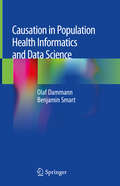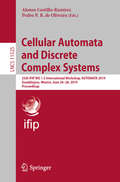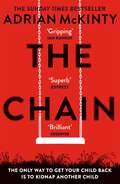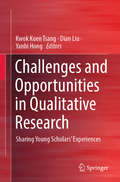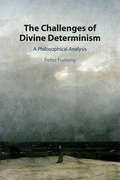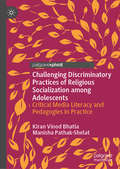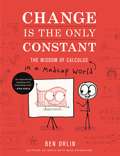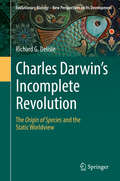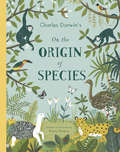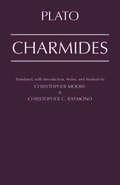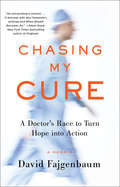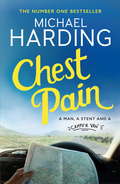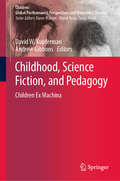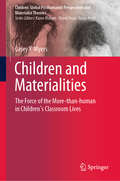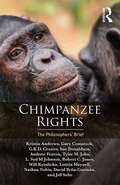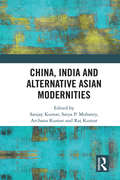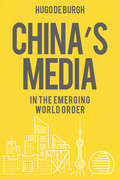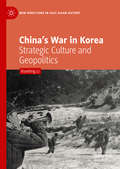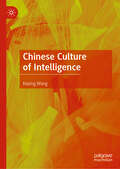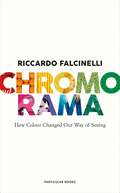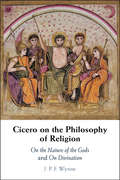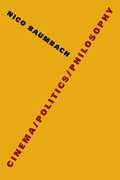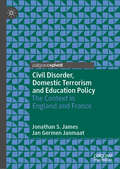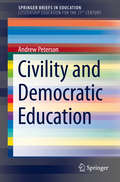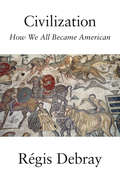- Table View
- List View
Causation in Population Health Informatics and Data Science
by Olaf Dammann Benjamin SmartMarketing text: This book covers the overlap between informatics, computer science, philosophy of causation, and causal inference in epidemiology and population health research. Key concepts covered include how data are generated and interpreted, and how and why concepts in health informatics and the philosophy of science should be integrated in a systems-thinking approach. Furthermore, a formal epistemology for the health sciences and public health is suggested. Causation in Population Health Informatics and Data Science provides a detailed guide of the latest thinking on causal inference in population health informatics. It is therefore a critical resource for all informaticians and epidemiologists interested in the potential benefits of utilising a systems-based approach to causal inference in health informatics.
Cellular Automata and Discrete Complex Systems: 25th IFIP WG 1.5 International Workshop, AUTOMATA 2019, Guadalajara, Mexico, June 26–28, 2019, Proceedings (Lecture Notes in Computer Science #11525)
by Alonso Castillo-Ramirez Pedro P. B. de OliveiraThis volume constitutes the refereed proceedings of the 25th IFIP WG 1.5 International Workshop on Cellular Automata and Discrete Complex Systems, AUTOMATA 2019, held in Guadalajara, Mexico, in June 2019.The 7 regular papers presented in this book were carefully reviewed and selected from a total of 10 submissions. The topics of the conference include deal with dynamical, topological, ergodic and algebraic aspects of CA and DCS, algorithmic and complexity issues, emergent properties, formal languages, symbolic dynamics, tilings, models of parallelism and distributed systems, timing schemes, synchronous versus asynchronous models, phenomenological descriptions, scientic modeling, and practical applications.
The Chain: The Award-Winning Suspense Thriller of the Year
by Adrian McKintyTHE ONLY WAY TO GET YOUR CHILD BACK IS TO KIDNAP ANOTHER CHILD'A blazing, full-tilt thriller that entirely justifies the hype' GUARDIAN'A heart-stopping roller coaster' DAILY MAIL* * * * *YOUR PHONE RINGS.A STRANGER HAS KIDNAPPED YOUR CHILD.TO FREE THEM YOU MUST ABDUCT SOMEONE ELSE'S CHILD.YOUR CHILD WILL BE RELEASED WHEN YOUR VICTIM'S PARENTS KIDNAP ANOTHER CHILD.IF ANY OF THESE THINGS DON'T HAPPEN:YOUR CHILD WILL BE KILLED.VICTIM. SURVIVOR. ABDUCTOR. CRIMINAL.YOU WILL BECOME EACH ONE. YOU ARE NOW PART OF THE CHAIN * * * * *THE MULTI-AWARD-WINNING THRILLERWinner: Theakstons Old Peculier Crime Novel of the YearWinner: Ned Kelly Award for Best International Crime Fiction Winner: International Thriller Writers Awards - Best Hardcover Winner: Macavity Awards - Best International Crime Fiction Winner: Barry Award - Thriller of the Year*****'A heart-stopping roller coaster'DAILY MAIL'The book everyone is talking about'MIRROR'Scary, plausible, gripping.'IAN RANKIN'You'll miss meals, sleep, and your stop on the bus - guaranteed.'VAL McDERMID'I writhed with the pain of withdrawal when I finished it. Deserves to be the popular hit of the year.'DAILY TELEGRAPH'Incredibly propulsive and original. You won't shake it for a long time.'STEPHEN KING'A masterpiece. You will never be able to forget it.'DON WINSLOW'A unique and unforgettable thriller. Breath-taking, breakneck, brilliant.'MARK BILLINGHAM'Striking, memorable, should be savoured.'TANA FRENCH'Explosively brilliant. Genuinely unputdownable. Terribly plausible'OBSERVER'I may not read a better thriller in my lifetime.'STEVE CAVANAGH 'An electrifying thriller - one of the very best of its kind'FIONA CUMMINS'What a fantastic idea and perfectly written. I'm quite jealous.'ANTHONY HOROWITZ'Terrifying. Terrific.'MICK HERRON'THE CHAIN does for parenting what Gone Girl did for marriage. A must-read thriller.'JAMES SWALLOW'Diabolical, unnerving, relentless.'DENNIS LEHANE'Utterly brilliant'ELLY GRIFFITHSA 'THRILLER OF THE YEAR' SELECTION FOR:GUARDIANDAILY TELEGRAPHAMAZONEXPRESSOBSERVERTIME MAGAZINE
Challenges and Opportunities in Qualitative Research: Sharing Young Scholars’ Experiences
by Kwok Kuen Tsang Dian Liu Yanbi HongThis book shares young scholars’ (current PhD students and those who completed their PhD between 2010 and 2015) experiences with conducting qualitative social research. Intended as a guide for newcomers to the field, it focuses on the practical issues encountered by qualitative researchers rather than methodological discussions. Accordingly, it addresses a range of representative issues in the qualitative research process – namely research design, data access, data collection, and data analysis – and covers a variety of social sciences topics.
The Challenges of Divine Determinism: A Philosophical Analysis
by Peter FurlongIn this volume, Peter Furlong delves into the question of divine determinism - the view that God has determined everything that has ever happened or will ever happen. This view, which has a long history among multiple religious and philosophical traditions, faces a host of counterarguments. It seems to rob humans of their free will, absolving them of all the wrongs they commit. It seems to make God the author of sin and thus blameworthy for all human wrongdoing. Additionally, it seems to undermine the popular 'Free Will Defense' of the problem of evil, to make a mockery of the claim that God loves us, and to make it inappropriate for God to blame and punish us. This work carefully formulates these and other objections to divine determinism and investigates possible responses to each of them, providing systematic and balanced discussion of this major philosophical and theological debate.
Challenging Discriminatory Practices of Religious Socialization among Adolescents: Critical Media Literacy and Pedagogies in Practice
by Kiran Vinod Bhatia Manisha Pathak-ShelatThis book examines how religion operates as an institution of governance and discipline in society. The authors unravel the ways in which adolescents are socialized into adhering to the dictates of their religious identities, which often translates into practices of micro-aggression enacted in and through their interaction with the ‘religious other’ in schools and classrooms. Through ethnographic immersion in villages in the Gujarat, the authors identify media as a powerful source through which the dominant ideology of religious discrimination is perpetuated among adolescents. Subsequently, a critical media education framework was developed in order to equip these young people with the critical skills needed to challenge power relations, with the goal being to identify resources for resistance within themselves and their immediate media environments. Using pedagogic techniques such as spatial and cultural mapping, content creation and applied theatre practices to create a reflective yet practical guide, the findings of this book can be applied to a wide range of socio-cultural contexts.
Change Is the Only Constant: The Wisdom of Calculus in a Madcap World
by Ben OrlinThe next book from Ben Orlin, the popular math blogger and author of the underground bestseller Math With Bad Drawings. Change Is The Only Constant is an engaging and eloquent exploration of the intersection between calculus and daily life, complete with Orlin's sly humor and wonderfully bad drawings. Change is the Only Constant is an engaging and eloquent exploration of the intersection between calculus and daily life, complete with Orlin's sly humor and memorably bad drawings. By spinning 28 engaging mathematical tales, Orlin shows us that calculus is simply another language to express the very things we humans grapple with every day -- love, risk, time, and most importantly, change. Divided into two parts, "Moments" and "Eternities," and drawing on everyone from Sherlock Holmes to Mark Twain to David Foster Wallace, Change is the Only Constant unearths connections between calculus, art, literature, and a beloved dog named Elvis. This is not just math for math's sake; it's math for the sake of becoming a wiser and more thoughtful human.
Charles Darwin's Incomplete Revolution: The Origin of Species and the Static Worldview (Evolutionary Biology – New Perspectives on Its Development #1)
by Richard G. DelisleThis book offers a thorough reanalysis of Charles Darwin's Origin of Species, which for many people represents the work that alone gave rise to evolutionism. Of course, scholars today know better than that. Yet, few resist the temptation of turning to the Origin in order to support it or reject it in light of their own work. Apparently, Darwin fills the mythical role of a founding figure that must either be invoked or repudiated. The book is an invitation to move beyond what is currently expected of Darwin's magnum opus. Once the rhetorical varnish of Darwin's discourses is removed, one discovers a work of remarkably indecisive conclusions. The book comprises two main theses: (1) The Origin of Species never remotely achieved the theoretical unity to which it is often credited. Rather, Darwin was overwhelmed by a host of phenomena that could not fit into his narrow conceptual framework. (2) In the Origin of Species, Darwin failed at completing the full conversion to evolutionism. Carrying many ill-designed intellectual tools of the 17th and 18th centuries, Darwin merely promoted a special brand of evolutionism, one that prevented him from taking the decisive steps toward an open and modern evolutionism. It makes an interesting read for biologists, historians and philosophers alike.
Charles Darwin's On the Origin of Species
by Sabina RadevaA picture book adaptation of Charles Darwin's groundbreaking On the Origin of Species, lushly illustrated and told in accessible and engaging easy-to-understand text for young readers.On the Origin of Species revolutionized our understanding of the natural world. Now young readers can discover Charles Darwin's groundbreaking theory of evolution for themselves in this stunning picture-book adaptation that uses stylish illustrations and simple text to introduce how species form, develop, and change over time.
Charmides
by Plato"Moore and Raymond's Charmides is very impressive. The translation is excellent, and the Introduction and notes guide the reader into thorny problems in a way that renders them understandable: e.g., how to translate sôphrosunê, why we should care about self-knowledge, or how to seek to clarify important ethico-political concepts. The result provides almost all of what an instructor will need to introduce this unjustly neglected dialogue into a syllabus. Moreover, the volume is a wide-ranging resource for specialists. Students of the 'Socratic Dialogues' will profit greatly from this admirable contribution." —David J. Murphy is co-editor of Antiphontis et Andocidis Orationes (Oxford) and author of "The Basis of the Text of Plato's Charmides" (Mnemosyne) and many other contributions on the Charmides. He lives in New York City.
Chasing My Cure: A Doctor's Race to Turn Hope into Action; A Memoir
by David FajgenbaumThe powerful memoir of a young doctor and former college athlete diagnosed with a rare disease who spearheaded the search for a cure—and became a champion for a new approach to medical research.“An extraordinary memoir . . . It belongs with Atul Gawande’s writings and When Breath Becomes Air.”—Adam Grant, New York Times bestselling author of OriginalsDavid Fajgenbaum was a former Georgetown quarterback nicknamed the Beast in medical school, where he was also known for his unmatched mental stamina. But things changed dramatically when he began suffering from inexplicable fatigue. In a matter of weeks, his organs were failing and he was read his last rites. Doctors were baffled by his condition, which they had yet to even diagnose. Floating in and out of consciousness, Fajgenbaum prayed for the equivalent of a game day overtime: a second chance. Miraculously, Fajgenbaum survived—only to endure repeated near-death relapses from what would eventually be identified as a form of Castleman disease, an extremely deadly and rare condition that acts like a cross between cancer and an autoimmune disorder. When he relapsed while on the only drug in development and realized that the medical community was unlikely to make progress in time to save his life, Fajgenbaum turned his desperate hope for a cure into concrete action: Between hospitalizations he studied his own charts and tested his own blood samples, looking for clues that could unlock a new treatment. With the help of family, friends, and mentors, he also reached out to other Castleman disease patients and physicians, and eventually came up with an ambitious plan to crowdsource the most promising research questions and recruit world-class researchers to tackle them. Instead of waiting for the scientific stars to align, he would attempt to align them himself. More than five years later and now married to his college sweetheart, Fajgenbaum has seen his hard work pay off: A treatment that he identified has induced a tentative remission and his novel approach to collaborative scientific inquiry has become a blueprint for advancing rare disease research. His incredible story demonstrates the potency of hope, and what can happen when the forces of determination, love, family, faith, and serendipity collide.“A page-turning chronicle of living, nearly dying, and discovering what it really means to be invincible in hope.”—Angela Duckworth, #1 New York Times bestselling author of Grit
Chest Pain: A man, a stent and a camper van
by Michael HardingIn late 2018, Michael Harding was in a hotel room in Blanchardstown experiencing severe pains in his chest. He eventually phoned an ambulance and was admitted to hospital, suffering from an acute heart attack. Here, in Chest Pain, he looks at the months before the heart attack when he kept the signs of failing health from his beloved and instead retreated into solitude -- and with his own inimitable style and humour takes us with him through the months after a stent had been inserted in his heart, where he travels the roads of Donegal in a camper van in a journey back to the beloved, and to himself.Chest Pain is a thought-provoking, spell-binding memoir about togetherness and what it means to be alive.
Childhood, Science Fiction, and Pedagogy: Children Ex Machina (Children: Global Posthumanist Perspectives and Materialist Theories)
by David W. Kupferman Andrew GibbonsThis book invites readers to both reassess and reconceptualize definitions of childhood and pedagogy by imagining the possibilities - past, present, and future - provided by the aesthetic turn to science fiction. It explores constructions of children, childhood, and pedagogy through the multiple lenses of science fiction as a method of inquiry, and discusses what counts as science fiction and why science fiction counts. The book examines the notion of relationships in a variety of genres and stories; probes affect in the convergence of childhood and science fiction; and focuses on questions of pedagogy and the ways that science fiction can reflect the status quo of schooling theory, practice, and policy as well as offer alternative educative possibilities. Additionally, the volume explores connections between children and childhood studies, pedagogy and posthumanism. The various contributors use science fiction as the frame of reference through which conceptual links between inquiry and narrative, grounded in theories of media studies, can be developed.
Children and Materialities: The Force of the More-than-human in Children’s Classroom Lives (Children: Global Posthumanist Perspectives and Materialist Theories)
by Casey Y. MyersThis book makes the case for young children as both keenly materially aware of and highly dependent on sets of interrelated material-discursive circumstances. It argues that long-term engagement with children around the topic of meaning-matter relations upends many taken-for-granted notions of consumption, self-regulation, knowledge production, and what constitutes quality of life within a school setting.The book provides complex accounts of agency on multiple scales - the capability of children to shape and share research, the force of objects, stuff, and things to impact the "social" workings of a classroom, and the impact of nonhuman animals on the trajectory of the ways in which children relate to each other.This work makes a significant contribution to both theoretical conceptions and practical enactments of childhoods, productively addressing the many contradictions inherent in a posthuman and participatory approach to researching with young children. It also offers insights into how the everyday materialities of children’s classrooms (and their complex representations) are capable of disrupting the common-sense order of things.
Chimpanzee Rights: The Philosophers’ Brief
by Kristin Andrews Gary L Comstock Crozier G.K.D. Sue Donaldson Andrew Fenton Tyler M John L. Syd Johnson Robert C Jones Will Kymlicka Letitia Meynell Nathan Nobis David Pena-Guzman Jeff SeboSince 2013, an organization called the Nonhuman Rights Project has brought before the New York State courts an unusual request—asking for habeas corpus hearings to determine whether Kiko and Tommy, two captive chimpanzees, should be considered legal persons with the fundamental right to bodily liberty. While the courts have agreed that chimpanzees share emotional, behavioural, and cognitive similarities with humans, they have denied that chimpanzees are persons on superficial and sometimes conflicting grounds. Consequently, Kiko and Tommy remain confined as legal "things" with no rights. The major moral and legal question remains unanswered: are chimpanzees mere "things", as the law currently sees them, or can they be "persons" possessing fundamental rights? In Chimpanzee Rights: The Philosophers’ Brief, a group of renowned philosophers considers these questions. Carefully and clearly, they examine the four lines of reasoning the courts have used to deny chimpanzee personhood: species, contract, community, and capacities. None of these, they argue, merits disqualifying chimpanzees from personhood. The authors conclude that when judges face the choice between seeing Kiko and Tommy as things and seeing them as persons—the only options under current law—they should conclude that Kiko and Tommy are persons who should therefore be protected from unlawful confinement "in keeping with the best philosophical standards of rational judgment and ethical standards of justice." Chimpanzee Rights: The Philosophers’ Brief—an extended version of the amicus brief submitted to the New York Court of Appeals in Kiko’s and Tommy’s cases—goes to the heart of fundamental issues concerning animal rights, personhood, and the question of human and nonhuman nature. It is essential reading for anyone interested in these issues.
China, India and Alternative Asian Modernities
by Satya P. Mohanty Archana Kumar Raj Kumar Sanjay KumarThe conception of modernity as a radical rupture from the past runs parallel to the conception of Europe as the primary locus of global history. The essays in this volume contest the temporal and spatial divisions—between past and present, modernity and tradition, and Europe’s progress and Asia’s stasis—which the conventional narrative of modernity creates. Drawing on early modern Chinese and Indian history and culture instead, the authors of the book explore the provenance of modernity beyond the west to see it in a transcultural and pluralistic light. The central argument of this volume is that modernity does not have a singular core or essence—a causal centre. Its key features need to be disaggregated and new configurations and combinations imagined. By studying the Bhakti movement, Confucian democracy, and the maritime and agrarian economies of China and India, this book enlarges the terms of debate and revisits devalued terms and concepts like tradition, religion, authority, and rural as resources for modernity. This book will be of great interest to researchers and academicians working in the areas of history, Sociology, Cultural Studies, literature, geopolitics, South Asian and East Asian Studies.
China's Media in the Emerging World Order: how they came to be a powerful new force in media (Internationalizing Media Studies)
by Hugo De BurghChina is challenging the mighty behemoths, Google and Facebook, and creating alternative New Media. 750 million people are active on its Social Mediascape and there are a billion mobile phones deploying the innovative apps with which the Chinese conduct their lives.Though late starters, already four of the world's leading New Media companies are Chinese. China's old media - television, newspapers, radio - challenge the established powers which were long thought unassailable, such as CNN and BBC. Produced in many languages on every continent, they are re-defining the agenda and telling the story in China's way, with not just news and documentary series but also entertainment. The world's biggest manufacturer of TV drama is now making its stories for export.China's Media tells you why and how. It investigates the Chinese media, their strengths and weaknesses and how they are different. from the West. This detailed and comprehensive guide aims to showcase their immense variety and diversity, and demonstrates how they came to be a powerful new force in the media world.
China’s War in Korea: Strategic Culture and Geopolitics (New Directions in East Asian History)
by Xiaobing LiThis book re-visits the history of the Korean War of 1950-1953 from a Chinese perspective, examining Chinese strategy and exploring why China sent three million troops to Korea, in Mao’s words, to “defend the homeland and safeguard the country”—giving rise to what became the war’s common name in China. It also looks into the relatively neglected historical factors which have redefined China’s security concerns and strategic culture. Using newly available sources from China and the former Soviet Union, the book considers how interactive the parameters of defense changes were in a foreign war against Western powers, how flexible Chinese strategy was in the context of its intervention, and how expansive its strategic cultural repertoire was at the crucial moment to “defend the country.” Providing a re-examination of China’s military decisions and strategy evolution, this text narrates the story of successive generations of Chinese leaders and provides a key insight into security issues in China and Northeast Asia today.
Chinese Culture of Intelligence
by Keping WangWith the rise of China in the 21st century, this book offers a trans-cultural and thematic study of key Chinese concepts which influence modern day Chinese thinking across the spheres of politics, economics and society. It reflects on the major schools of Chinese thought including Confucianism, Daoism and Zen Buddhism, providing a historical perspective on the ideological development of China in terms of the relationship between man and nature, social ethics, political governance, poetry education, aesthetic criticism and art theory. It also explores primary aspects of Chinese poetics and aesthetics with reference to the interaction between the endogenous theories and their western counterparts. Written by a leader in Chinese Aesthetics against the background of both globalization and glocalization at home and abroad, this is a key read for all those interested in the cultural, philosophical and aesthetic underpinnings of contemporary China.
Chromorama: How Colour Changed Our Way of Seeing
by Riccardo FalcinelliThe Italian colour bible: a gorgeously illustrated exploration of colour and the modern gaze, from an award-winning designer'Fresh and exciting, like an unopened packet of coloured pencils. Countless thought-provoking facts to ponder over, beautifully written' Coralie Bickford-Smith, author of The Fox and the StarWhy are pencils yellow and white goods white? Why is black the colour of mourning? What connects Queen Victoria's mauve gown and Michelle Obama's yellow dress? In Chromorama, acclaimed graphic designer Riccardo Falcinelli delves deep into the history of colour to show how it has shaped the modern gaze. With over four hundred illustrations throughout and with examples ranging widely across art and culture - from the novels of Gustave Flaubert to The Simpsons, from Byzantine jewellery to misshapen fruit, from Mondrian to Hitchcock's thrillers - Falcinelli traces the evolution of our long relationship with colour, and how first the industrial revolution, and then the dawn of the internet age, changed it forever. Beautifully designed, deeply researched, and written with warmth and wit, Chromoroma is an engrossing account of shade and light, of tone and hue, of dyes, pigments, and pixels. It is the story of why we now see the world the way we do.
Cicero on the Philosophy of Religion: On the Nature of the Gods and On Divination
by J. P. WynneDuring the months before and after he saw Julius Caesar assassinated on the Ides of March, 44 BC, Cicero wrote two philosophical dialogues about religion and theology: On the Nature of the Gods and On Divination. This book brings to life his portraits of Stoic and Epicurean theology, as well as the scepticism of the new Academy, his own school. We meet the Epicurean gods who live a life of pleasure and care nothing for us, the determinism and beauty of the Stoic universe, itself our benevolent creator, and the reply to both that traditional religion is better served by a lack of dogma. Cicero hoped that these reflections would renew the traditional religion at Rome, with its prayers and sacrifices, temples and statues, myths and poets, and all forms of divination. This volume is the first to fully investigate Cicero's dialogues as the work of a careful philosophical author.
Cinema/Politics/Philosophy (Film and Culture Series)
by Nico BaumbachAlmost fifty years ago, Jean-Louis Comolli and Jean Narboni published the manifesto “Cinema/Ideology/Criticism,” helping to set the agenda for a generation of film theory that used cinema as a means of critiquing capitalist ideology. In recent decades, film studies has moved away from politicized theory, abandoning the productive ways in which theory understands the relationship between cinema, politics, and art. In Cinema/Politics/Philosophy, Nico Baumbach revisits the much-maligned tradition of seventies film theory to reconsider: What does it mean to call cinema political?In this concise and provocative book, Baumbach argues that we need a new philosophical approach that sees cinema as both a mode of thought and a form of politics. Through close readings of the writings on cinema by the contemporary continental philosophers Jacques Rancière, Alain Badiou, and Giorgio Agamben, he asks us to rethink both the legacy of ideology critique and Deleuzian film-philosophy. He explores how cinema can condition philosophy through its own means, challenging received ideas about what is seeable, sayable, and doable. Cinema/Politics/Philosophy offers fundamental new ways to think about cinema as thought, art, and politics.
Civil Disorder, Domestic Terrorism and Education Policy: The Context in England and France
by Jonathan S. James Jan Germen JanmaatThis book explores the links between education policy and occurrences of civil disorder and domestic terrorism in England and France. Since 2001, both England and France have experienced outbreaks of rioting in which young people of immigrant origin have been implicated: both have also been the targets of domestic terror attacks perpetrated by their own citizens. Both countries have had similar experiences of immigration since the end of the Second World War, but they are considered to have taken divergent approaches to immigrant integration and education. While Britain has tended towards a multicultural race relations approach, France veers towards a Republican assimilationist approach. Through the analysis of policy discourse and documents, the authors seek to establish whether these distinct approaches to immigrant integration and education policy have been maintained or whether they are converging. This book will appeal to students and scholars of education policy as well as immigration and integration in both France and England.
Civility and Democratic Education (SpringerBriefs in Education)
by Andrew PetersonThis book explores how and why civility contributes to a vibrant democratic society, and how it can be fostered and cultivated as a key part of democratic education. It suggests that civility only makes sense as a civic virtue if it is conceived in relation to civic friendship, concord and fellow-feeling. This book offers a timely snapshot of civility as a pressing, yet enduring, concern in democratic life and education. It elucidates a virtue-based conceptualization of civility and its place within democratic education, and makes use of real-life examples and cases to illustrate its arguments and to engage a range of readers. In short, this book is interested in what civility is and how schools can and do cultivate civility.
Civilization
by Regis DebrayAmerican civilisation's dominance over Europe - and what to do about it'Civilization' -- a hard term to define. But while every society has a distinctive culture, authentic civilizations must offer those they subjugate an attractive way of life. Their imprint outlasts their imperium.A century ago, Debray argues, there was a European civilization of which America was an outlying culture; but today the relationship is reversed. 'In 1900, an American of taste was a European in exile; in 2000, a trendy European is a frustrated American - or one waiting for a visa'. Characteristic of American civilization is its three overarching fetishes: space, image and happiness. America is a civilization of space and image, whereas Europe was one of time and writing. And its kitsch infantilism blinds itself to the tragic complexities of human life. A measure of America's success is how its 'globish' jargon has so successfully infiltrated European languages.For Debray, the dominance of American civilization is a historical fait accompli, yet he sees a model for Europe in Vienna after its exclusion from the German Reich. For decades to come, Europe can still offer a rich cultural seedbed. 'Some will call it decadence, others liberation. Why not both?'
